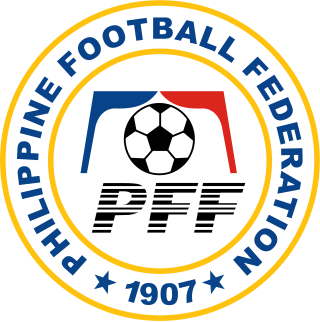
The Philippine Football Federation (PFF) is the governing body of association football in the Philippines. Established as the Philippine Amateur Football Association (PAFA) in 1907, the PFF is one of the oldest national football associations in Asia and is among the founding members of the Asian Football Confederation (AFC). The PAFA reorganized as the Philippine Football Association (PFA), and later as the Philippine Football Federation.

Baldomero Aguinaldo y Baloy was a leader of the Philippine Revolution. He was the first cousin of Emilio Aguinaldo, the first president of the Philippines, as well as the grandfather of Cesar Virata, a former prime minister in the 1980s.

The Philippine Daily Inquirer (PDI), or simply the Inquirer, is an English-language newspaper in the Philippines. Founded in 1985, it is often regarded as the Philippines' newspaper of record. The newspaper is the most awarded broadsheet in the Philippines and the multimedia group, called The Inquirer Group, reaches 54 million people across several platforms.

The National University (NU), colloquially National U, is a private non–sectarian coeducational university located in Sampaloc, Manila, Philippines. The founder of the university, Mariano F. Jhocson Sr., established the institution on August 1, 1900, as Colegio Filipino in Quiapo, Manila. It is considered as the first private nonsectarian and coeducational institution in the Philippines and also, the first university to use English as its medium of instruction, replacing Spanish.

Jorge Bartolomé Vargas y Celis was a Filipino lawyer, diplomat and youth advocate born in Bago, Negros Occidental, Philippines. He graduated valedictorian from Negros Occidental High School in 1909 and obtained a Bachelor of Arts degree in 1911 and a Bachelor of Law degree with honors in 1914, both from the University of the Philippines. He was a founding member of the Philippine Amateur Athletic Federation in 1911 and served in its executive committee in 1918. He served as its second chairman from 1935 to 1955. He was also the first Filipino member of the International Olympic Committee.
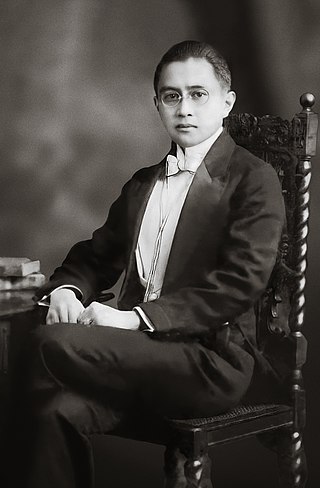
Don Gabriel A. Daza, KGCR, KC*SS was the first Filipino electrical engineer and one of the charter members of the Boy Scouts of the Philippines (BSP). He co-founded the Philippine Long Distance Telephone Company (PLDT), Philippine Telegraph and Telephone Co. (PT&T), Philippine Electric Manufacturing Company (PEMCO), Phelps Dodge Philippines. He was the supervising engineer and assistant general manager of Visayan Electric Company (VECO) and led its expansion out of Cebu City. President and chief scout of the BSP in 1961–68. In 1945, President Osmeña appointed Daza to be a member of the board of directors of the Manila Railroad Company and the Philippine Charity Sweepstakes Office. In 1950, he was vice-chairman of the National Power Corporation and on the board of directors of the Manila Hotel Company. In 1951, Daza was appointed by President Quirino as a founding member of the board of directors of the National Shipyard and Steel Corporation. President and director of the National Economic Protection Agency (NEPA) in 1956.
Sir Hermenegildo B. Reyes, KGCR co-founded the University of the East, was a Boy Scouts of the Philippines Scouting notable, Filipino educator, lawyer, mechnical and electrical engineer. Reyes served on the World Scout Committee of the World Organization of the Scout Movement from 1961 to 1967.
The history of nursing in the Philippines stems from the caregiving provided by women, priests, and herb doctors during precolonial Philippines. Even though women did not have much opportunity to be formally educated in schools because only a limited number of Filipino women received primary education in charitable institutions established by Spaniards, this trend continued during the Spanish colonial era. During the Philippine revolution, Filipino women also became the providers of care for wounded revolutionaries. During the American period in the Philippines, Filipino women were given the chance to become educated as nurses, guided by their American nurse and missionary mentors, until nursing became a full-pledged profession in the Philippines, a professional career not only for modern-day women in the country but also for men in the Philippines.
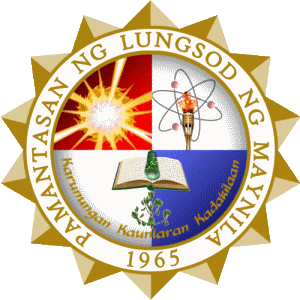
The Pamantasan ng Lungsod ng Maynila is a city-government-funded local university situated inside the historic walled area of Intramuros, Manila, Philippines. It was established on June 19, 1965, and opened on July 17, 1967, to 556 scholars, all coming from the top ten percent of graduates of Manila's public high schools.

The Manila Police District (MPD) is the agency of the Philippine National Police (PNP) responsible for law enforcement in the City of Manila including the Manila South Cemetery exclave. Formerly known as the Western Police District (WPD), the MPD is under the National Capital Region Police Office (NCRPO), which also handles the Quezon City, Eastern, Northern and Southern Police Districts.

Malate Catholic School is a private catholic gender-isolated K to 12 school in Malate Metro Manila Philippines established in 1917. It is accredited by PAASCU.
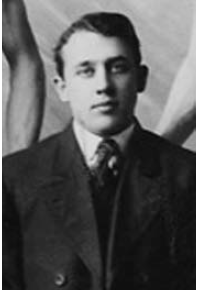
Elwood Stanley Brown was an American sports organizer in Illinois, Manila, Europe, and South America. In his short life, he had a number of major accomplishments, such as, the intensive promotion of sports among Filipinos. Introducing international sports competitions in Asia. The promotion of the Olympics around the world. Founding of the first Boy Scout troops in the Philippines (1910), initiating and organizing the American Expeditionary Forces games and its corollary the Inter-Allied Games at the end of the War in Europe.

The Philippine Institute of Architects (PIA) is an architectural society in the Philippines and is the oldest architectural society in Asia. It is composed of noble men and women from the architectural profession of the Philippines. It was founded by renowned architects in 1933 whose ultimate endeavor is the professional development of architecture in the Philippines.
The following is a timeline of the history of the city and metropolitan area of Manila, the capital city of the Philippines.

In the New York metropolitan area, Filipinos constitute one of the largest diasporas in the Western Hemisphere. By 2014 Census estimates, the New York City-Northern New Jersey-Long Island, NY-NJ-CT-PA Combined Statistical Area was home to 262,375 Filipino Americans, 221,612 (84.5%) of them uniracial Filipinos.
The Central Philippine University College of Nursing, also known as CPU CON or CPU College of Nursing, is a department within Central Philippine University, a private university in Iloilo City, Philippines. It was established in 1906 as the Union Mission Hospital Training School for Nurses as the first nursing school in the Philippines.
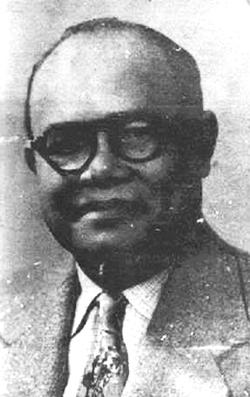
Gabriel Fabrero Fabella was a prominent Filipino historian during the 20th century. He is primarily known as the historian behind Philippine President Diosdado Macapagal's decision to issue Proclamation No. 28 on May 12, 1962, which changed the date of Philippine independence from July 4, 1946 to June 12, 1898 – the date when Philippine President Emilio Aguinaldo proclaimed the country's independence from Spain in Kawit, Cavite. For this achievement, Fabella became known as the "Father of June 12 Independence Day."

Carlos Edriel Poquiz Yulo is a Filipino artistic gymnast who has won multiple medals at the World Artistic Gymnastics Championships. He is the first Filipino and the first male Southeast Asian gymnast to medal at the World Artistic Gymnastics Championships with his floor exercise bronze medal finish in 2018, and the first ever gold medal for the Philippines in 2019 in the same event. This performance also qualified him for the 2020 Summer Olympics in Tokyo. A specialist in the floor, parallel bars, and vault apparatus, Yulo is noted for his precision in form and the difficulty of his routines, especially in floor exercise.
Anastacia or Annastacia is a feminine given name. Notable people with this name include:
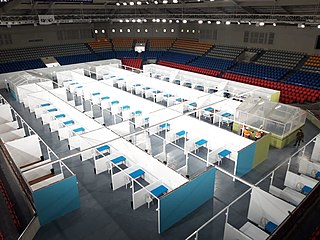
The COVID-19 pandemic had a significant impact on the conduct of sports in the Philippines affecting both competitive sports leagues and tournaments and recreational sports.















